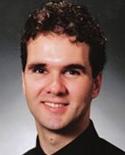WT Godbey, PhD
Paul H. & Donna D. Flower Assistant Professor in Engineering

Biography
W T. Godbey is an Assistant Professor in the Departments of Chemical Engineering and Biomedical Engineering at Tulane University. He received his B.S. in Mathematics from Southern Methodist University in 1988. After a successful period that involved starting his own software design and development company in Dallas, Texas, he joined the fields of science and engineering and earned his Ph.D. as a National Science Foundation Graduate Fellow from the Institute for Biosciences and Bioengineering at Rice University in Houston, Texas, in 2000. From 2000-2003 he was a postdoctoral fellow at Children's Hospital, Boston, and Harvard Medical School. He joined the Tulane faculty in 2003. Gobdey's research interests are centered on gene therapy and the manipulation of cell at the genetic level. He has published several papers on the subjects of cellular processing of non-viral gene delivery agenst and the use of gene therapy for treatment of bladder cancer. His current research interests include the use of gene therapy for carcinoma treatment, controlled release applications for efficient gene delivery, and the use of gene delivery for cellular engineering.
Research
Tulane Cancer Center Member in the Signaling Program
Contributions
Interests
Gene Delivery, Cellular Engineering, Molecular Aspects of Nonviral Transfection and Biomaterials
The research projects of this laboratory are encompassed by the development and application of gene therapy techniques for tissue and cellular engineering. The design and testing of novel gene delivery vehicles is of some interest, while the application of gene therapy for clinically oriented results is a major focus of the laboratory.
One major project in the Godbey laboratory is focused on the treatment of an entire class of cancers via expression-targeted gene delivery. The delivered DNA in this application acts as a "smart gene" to selectively cause the destruction of specific cancer cells while having little or no effect upon healthy, untransformed cells. This method is showing great promise as a possible treatment for many conditions such as bladder, colon, and prostate cancers.
Other projects include the merging of the fields of molecular and cell biology with engineering to yield cells that are receptive to artificial external signals. Following the administration of an external, user-controlled signal, the engineered cells are to respond in a predetermined way that might include the production of specific factors or an altered behavior such as enhanced mobility. Such engineered cells are excellent candidates for seeding onto biodegradable scaffolds. Over time, these scaffolds would mature into implants suitable for eventual implantation into waiting patients.
